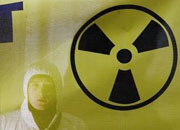The 120 tonne stockpile, its maintenance and storage is to be entirely provided by Russia and held at the newly founded International Uranium Enrichment Centre at Angarsk. The IAEA said the value of the uranium was about $250 million.
The idea is that any IAEA member country will be able to draw on the reserve if it were denied supply from the normal routes - apart from for technical or commercial reasons. In other words, any country employing nuclear power peacefully and in keeping with its obligations to the international community through the IAEA would not suffer supply disruption for political reasons.
However, what those reasons may be and how the reserve would operate under difficult political circumstances is not clear. World Nuclear Association director general and former US Ambassador to the IAEA John Ritch said, "Any mechanism that truly fortifies the nuclear non-proliferation system warrants support, both from the nuclear industry and from governments worldwide," but noted that "no-one has yet explained a scenario where a country is denied fuel by other governments even though it is meeting its commitments - and then turns to the same governments to supply the fuel through the IAEA."
The reserve was endorsed by the IAEA board in November last year after an official Russian proposal. Russia noted at that time that "The main guarantee of reliable nuclear fuel supplies is a properly functioning market where both suppliers and consumers comply with their obligations under commercial contracts."
The IAEA director general has authority to complete contracts for any future user, which would have to pay the prevailing spot market price for uranium. The 120 tonne inventory of uranium would be enriched in the range of 2.0% to 4.95% uranum-235 and stored as uranium hexafluoride. It is roughly enough to manufacture about six reloads or one full core load for a new reactor.
11 Февраля 2026 | среда | 00:18


